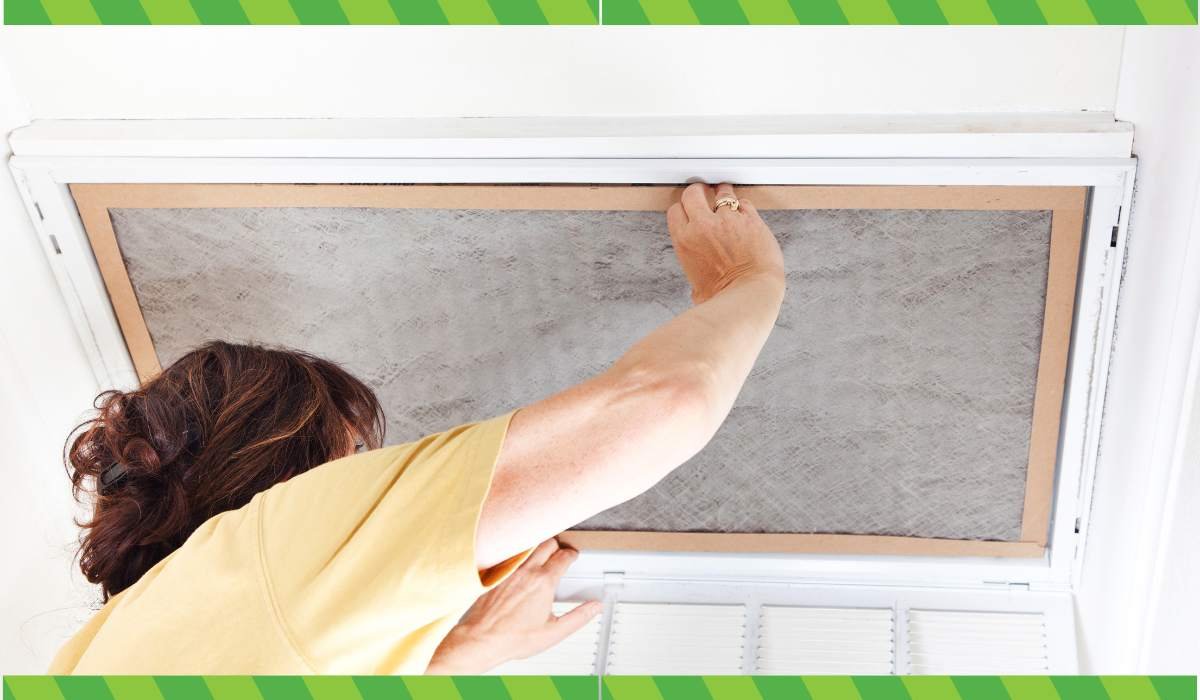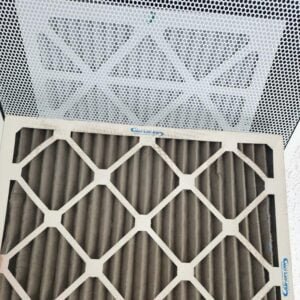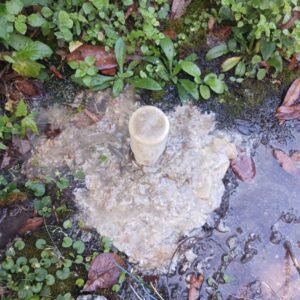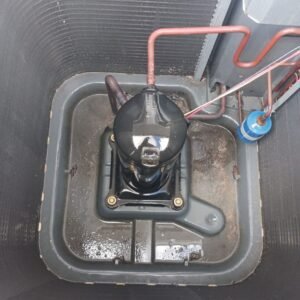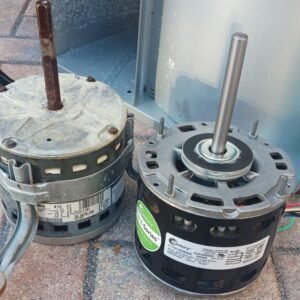Can I fix my own AC?
As the weather heats up, homeowners across the world turn to their trusty air conditioning (AC) units to keep their homes cool and comfortable. However, just like any other appliance in your home, AC units can experience problems from time to time. Some problems can be minor and easily fixed by a homeowner, while others can be major and require the expertise of a professional HVAC technician.
Many homeowners wonder if they can fix their own AC units. After all, it can be tempting to save money by attempting to tackle the issue yourself. But the reality is that not all AC problems can be fixed by non-professionals, and attempting to fix a major issue yourself can be dangerous and potentially cause more damage to your unit.
In this blog post, we will explore the question, “Can I fix my own AC?” We will provide examples of minor and major AC problems, and discuss which ones can be tackled by a homeowner and which ones require the expertise of a professional. We will also provide tips for maintaining your AC unit to prevent problems from occurring in the first place.
So, whether you’re dealing with a minor issue such as a clogged air filter or a major issue such as a refrigerant leak, this blog post will help you understand which problems you can tackle yourself and which ones require professional attention.
Minor AC Problems:
Not all AC problems require the expertise of a professional HVAC technician. In fact, some common AC issues can be fixed easily by a homeowner with a bit of knowledge and some basic tools. These minor AC problems may not require extensive repairs or costly parts replacements, making them a cost-effective solution for homeowners.
In this section, we will discuss some examples of minor AC problems that homeowners can potentially fix themselves. These issues often involve simple troubleshooting, cleaning, or maintenance tasks that can be done without special tools or equipment. By understanding these minor AC problems and how to fix them, homeowners can save money and ensure that their AC unit is running smoothly and efficiently.
Examples of minor AC problems include:
- Dirty air filter: Dirty air filters can clog the airflow of your AC, making it less efficient. This can cause the AC to work harder, resulting in higher energy bills. Fortunately, cleaning or replacing the air filter is a simple DIY task that can be done by anyone.

Can I fix my own AC?
Dirty AC Filter - Thermostat issues: The thermostat is the brain of your AC. It regulates the temperature and humidity of your home, and if it is not working correctly, it can cause your AC to malfunction. In some cases, the issue may be a dead battery or a wiring problem, which can be fixed by the homeowner. Try putting the thermostat on fan Auto and lowering the temperature below the house temp.
- Clogged drain line:
Over time, dirt, dust, and debris can build up in the drain line of your AC unit, causing it to become clogged. When this happens, water can back up into the unit, potentially causing water damage or even shutting down the entire system. To fix this issue, you can try cleaning the drain line yourself by using a wet/dry vacuum to remove any debris. You can also use a solution of vinegar and water to flush out the line. If the drain line is severely clogged, it may require professional help.
When dealing with a clogged drain line, it is also important to check the float switch. The float switch is a safety device that turns off the AC unit if the drain pan fills up with water. If the drain line is clogged and the pan is full of water, the float switch will trigger and turn off the unit. In some cases, you can reset the float switch yourself by locating it near the drain pan and pressing the reset button. However, if the float switch continues to trip, it may be a sign of a more serious issue and should be inspected by a professional.
Regular maintenance, such as cleaning or replacing air filters, can help prevent clogged drain lines and other AC problems. If you notice water pooling around your AC unit or hear gurgling sounds coming from the drain line, it is important to take action to prevent further damage to your unit. By regularly maintaining your AC unit and addressing any issues as soon as they arise, you can keep your unit running smoothly and efficiently.

Can I fix my own AC?
Clogged Drain Line - Dirty condenser coils: The condenser coils are located outside your home and are responsible for releasing the heat absorbed by the refrigerant. If the coils are dirty, they cannot release heat effectively, which can cause your AC to work harder and increase your energy bills. Cleaning the coils is a simple DIY task that can be done with a garden hose and some mild detergent.
- Blocked air vents: Blocked air vents can prevent air from flowing through your AC, making it less efficient. This can cause your AC to work harder and increase your energy bills. Checking and cleaning the air vents is a simple DIY task that can be done by removing any obstructions and ensuring that the vents are not covered by furniture or other objects.
- Tripped circuit breaker: If your AC unit suddenly stops working, it could be due to a tripped circuit breaker. A tripped circuit breaker is often caused by an electrical overload or a short circuit. To fix this issue, you can try resetting the circuit breaker by switching it off and then back on. However, if the circuit breaker continues to trip, it may be a sign of a more serious electrical issue and should be addressed by a professional. It is important to note that while these are examples of minor AC problems, it is always best to consult with a professional if you are unsure about how to fix the problem or if the problem persists after attempting DIY repairs. A professional can diagnose the issue and recommend the best course of action to get your AC up and running again.
Major AC Problems:
While minor AC problems can often be tackled by homeowners, there are certain AC issues that require the expertise of a professional HVAC technician. These major AC problems may involve complex repairs, specialized equipment, or potentially dangerous situations that should only be handled by a trained professional.
In this section, we will discuss some examples of major AC problems that typically require professional attention. These issues can be more challenging to diagnose and fix, and attempting to tackle them as a non-professional can lead to further damage or safety risks. By understanding these major AC problems, homeowners can better recognize when to seek professional help and avoid potentially costly mistakes.
While it can be tempting to try to save money by fixing major AC problems yourself, it is important to prioritize safety and the long-term health of your AC unit. By working with a professional HVAC technician, you can ensure that your AC unit is repaired correctly and efficiently, leading to a longer lifespan and improved performance.
Examples of major AC problems include:
- Refrigerant leaks: Refrigerant is a vital component of your AC. It cools the air that flows through the unit, and if there is a leak, your AC will not function correctly. Fixing a refrigerant leak requires specialized equipment and training, and it is not a DIY task.
- Compressor failure: Compressor failure is a serious issue that can cause your AC unit to stop working altogether. The compressor is the heart of your AC unit and is responsible for compressing the refrigerant, which is necessary for the cooling process. If the compressor fails, your AC unit may not be able to function properly.Some signs of compressor failure include:
- Warm air: Your AC unit may blow warm air or no air at all.
- Loud noises: You may hear loud banging, rattling, or grinding noises coming from your AC unit.
- Tripped breakers: A failing compressor can cause the electrical circuit to overload, leading to tripped breakers.
- Increased energy bills: A failing compressor may cause your AC unit to work harder and use more energy, resulting in higher energy bills.
If you suspect that your AC unit’s compressor is failing, it is important to contact a professional HVAC technician, such as The AC Therapist, for repairs. Attempting to fix a compressor issue yourself can be dangerous and may cause further damage to your AC unit.
A professional HVAC technician can diagnose the issue and determine if the compressor needs to be replaced or repaired. Compressor replacement can be a costly repair, but it may be necessary to restore your AC unit to optimal performance. A professional technician can also inspect other components of your AC unit to ensure that there are no other underlying issues that need to be addressed.
By working with a professional, you can have peace of mind knowing that your AC unit is in good hands and that the repairs are being made safely and efficiently. If you suspect that your AC unit’s compressor is failing, don’t hesitate to contact The AC Therapist for expert AC repair services. They have the knowledge, experience, and expertise needed to diagnose and repair compressor issues quickly and efficiently, ensuring that your AC unit is up and running again in no time.

Can I fix my own AC?
Compressor failure - Electrical problems: Electrical problems can cause your AC to malfunction, and they can be dangerous if not handled correctly. Examples of electrical problems include faulty wiring, malfunctioning capacitors, and broken relays. These problems require the expertise of an electrician or HVAC technician.
- Frozen evaporator coils: If the evaporator coils in your AC unit freeze over, it can prevent air from flowing through the unit, causing your AC to stop working. This problem can be caused by a variety of issues, such as low refrigerant levels, dirty air filters, or a malfunctioning blower motor. Fixing the problem often requires the expertise of a professional.
- Faulty Capacitor: A faulty capacitor is another common issue that can cause problems with your AC unit. The capacitor is a small electrical component that stores and releases electrical energy to help start the compressor and fan motor. If the capacitor is faulty or fails, your AC unit may not be able to start or may experience reduced cooling capacity.Some signs of a faulty capacitor include:
- Difficulty starting: Your AC unit may struggle to start or may take longer than usual to start up.
- Reduced cooling capacity: Your AC unit may not be able to cool your home as effectively as it should.
- Strange sounds: You may hear clicking or humming noises coming from your AC unit.
- Tripped breakers: A faulty capacitor can cause the electrical circuit to overload, leading to tripped breakers.
If you suspect that your AC unit’s capacitor is faulty, it is important to contact a professional HVAC technician, such as The AC Therapist, for repairs. Attempting to fix a faulty capacitor yourself can be dangerous, particularly if you are not familiar with electrical systems.
- Faulty fan motor: The fan motor is responsible for circulating air through your AC. If it is not working correctly, it can cause your AC to malfunction. In some cases, the control module goes bad and that is the only part that needs to be replaced. However, if the fan motor needs to be replaced, it is best to hire a professional.

Can I fix my own AC?
Faulty Fan Motor - Dirty evaporator coils: The evaporator coils are located inside your home and are responsible for absorbing heat and humidity from the air. If the coils are dirty, they cannot absorb heat effectively, which can cause your AC to work harder and decrease its efficiency. Cleaning the coils is a simple DIY task that can be done by removing the coil cover and gently cleaning the coils with a soft brush and some mild detergent.
The risks of “Can I fix my own AC?”
While some AC problems can be fixed by a homeowner, attempting to fix certain issues yourself can be risky and potentially dangerous. Here are some of the risks associated with fixing your AC yourself:
- Personal injury: Working on an AC unit can be dangerous and requires knowledge of electrical and mechanical systems. Without the proper training or experience, you risk injuring yourself or others. For example, working with refrigerants without proper safety precautions can lead to chemical burns or inhalation injuries. Additionally, handling electrical components can lead to electrical shocks, which can be life-threatening.
- Further damage to your AC unit: Attempting to fix a complex issue yourself can lead to further damage to your AC unit. Without proper knowledge or tools, you may cause more harm than good, resulting in costly repairs or even the need for a full unit replacement.
- Warranty concerns: Attempting to fix your AC unit yourself may void any existing warranties on the unit. If you cause damage to the unit while attempting to fix it, you may be responsible for the cost of repairs or replacement, rather than having it covered under warranty.
- Code violations: Certain AC repairs require adherence to building codes and safety standards. Attempting to fix the issue yourself may result in code violations, which can lead to fines or legal consequences.
In general, it is important to prioritize safety and the long-term health of your AC unit. While it can be tempting to save money by fixing AC problems yourself, it is important to recognize when a problem requires professional attention. HVAC technicians have the training and expertise needed to diagnose and fix complex issues, ensuring that your unit is repaired correctly and efficiently. By working with a professional, you can ensure that your AC unit remains safe, efficient, and reliable for years to come.
The benefits of hiring a professional
Hiring a professional HVAC technician to fix your AC unit can provide a number of benefits. Here are some reasons why you may want to consider hiring a professional, such as The AC Therapist, for your AC repair needs:
- Expertise: Professional HVAC technicians have the training and experience needed to diagnose and fix a wide range of AC problems. They have knowledge of electrical and mechanical systems, refrigerant handling, and building codes and safety standards. By working with a professional, you can have peace of mind knowing that your AC unit is in good hands.
- Efficiency: Professional HVAC technicians have the tools and expertise needed to fix complex issues quickly and efficiently. They can diagnose problems more accurately and make repairs more efficiently, saving you time and money in the long run.
- Safety: AC repair can be dangerous, particularly when working with electrical or refrigerant systems. HVAC technicians have the training and safety equipment needed to work safely on your AC unit, minimizing the risk of injury or damage.
- Warranties: Professional AC repair services typically come with warranties or guarantees, ensuring that your AC unit is repaired correctly and efficiently. If something goes wrong after the repair, you can typically rely on the warranty to cover any necessary repairs or replacements.
When it comes to AC repair, The AC Therapist is a reputable and reliable choice. Their team of experienced technicians is dedicated to providing high-quality AC repair services to homeowners in the Tampa Bay area.
They offer a range of services, including AC repair, installation, and maintenance, and are committed to providing fast, efficient, and affordable solutions to their clients. Whether you are dealing with a minor issue or a major AC problem, The AC Therapist has the expertise and experience needed to get your unit up and running again in no time.

